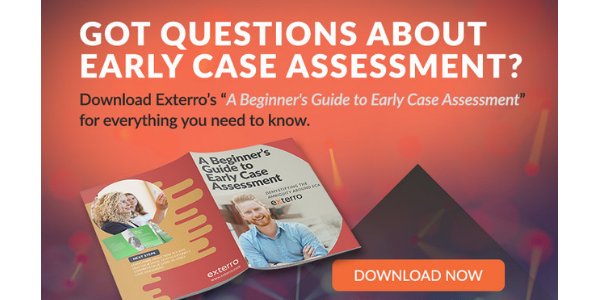E-Discovery
Be Prepared! Don’t Show Up to Your Rule 26(F) Meet-and-Confer With Nothing But a Boilerplate
February 23, 2023

One of the key themes of successful e-discovery that federal judges have emphasized for years is the importance of preparation and precision both in crafting discovery requests and in objections. The revised Federal Rules of Civil Procedure make it quite clear that you must prepare requests with "reasonable particularity."
Put more simply, you can't fake it. You have to know your stuff. What are you asking for? What are the reasons for your objection? Fortunately, early case assessment technology can help you get a look at the information you need before you even have to collect it and set you up for sucess with deep insight into the data at hand.
One particular step of the e-discovery process allows you to understand and communicate the specifics with opposing counsel, setting you up for success: the Rule 26(f) "Meet and Confer" conference.
FRCP Rule 26(f) stipulates a conference of the parties so that they might plan for discovery.
- Who: The attorneys of record and all unrepresented parties that have appeared in the case
- What: Parties must consider the nature and basis of their claims and defenses; make or arrange for the disclosures required by Rule 26(a)(1); discuss any issue about preserving discoverable information; develop a discovery plan
- When: As soon as is practicable, but at least 21 days before a scheduling conference or scheduling order under Rule 16(b).
FRCP Rule 26’s emphasis on proportionality gets a jump start with the revised language around the meet-and-confer conference. With the deadline falling sooner, and a requirement to come prepared with a deep knowledge of your case and your data, clear objectives for discovery, and any issues with privilege or protection that may need an order under FRE 502, this meeting changes from a procedural obligation to a vital step in fulfilling the goals of Rule 1, keeping litigation “just, speedy and inexpensive.”
Preparation is key for any meet and confer conference to be successful. Having a deep knowledge of your case and your data, along with clear objectives, will make this meeting not just a procedural obligation, but a key tool for streamlining activities and proactively reducing e-discovery expenses.
Here are a few things to remember:
- Know where your potentially relevant data is stored and what it takes to collect it. Too often, legal teams find themselves required to collect data and they have no idea where it is; and, once they do find it, realize that they may not have the tools to collect it. By understanding your data, you not only save time and stress when it comes to collection, but you also will have advanced insight into potential ways that you might be able to reduce the burden and/or cost of e-discovery, as well as understanding if there are any considerations regarding privilege.
- Additionally, the meet and confer is a great chance to clearly understand what they key issues of the case are for opposition and determine where you can find common ground. Take this opportunity seriously. By conducting a meaningful meet and confer, which should include an IT representative from each side, parties can create an e-discovery protocol that empowers both sides to quickly find and review the key pieces of evidence to the case.
- Final note, if you’re unsatisfied with what the e-discovery parameters, try first to present options to the other side explaining your reasoning. If that is unsuccessful and your opponent decides to file a motion to compel, be sure to explain to the judge with metrics on the reasoning behind your decision not to comply. Speculation or boilerplate responses will not be accepted by the court.
For a step-by-step rundown of everything you need to do to prepare for your meet-and-confer, download this checklist!